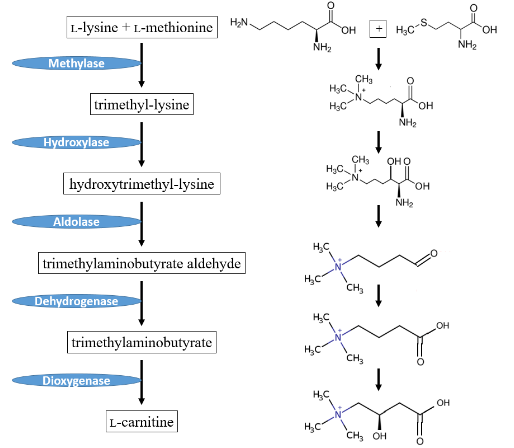 Last week I discussed meldonium, which was banned by the World Anti-Doping Agency (WADA) in January 2016 for use by sportsmen and women, because it supposedly increases blood flow and therefore exercise capacity. Meldonium is the International Nonproprietary Name (INN) of 3-(2,2,2-trimethyldiazaniumyl)propanoate, an analogue of the immediate precursor of carnitine, trimethylaminobutyrate (Figure 1). Meldonium is transported by and inhibits an organic cation transporter (OCTN2), which transports carnitine and is also known as SLC22A5. It is therefore retained in muscle tissue during long term treatment, at least in animals. It also inhibits the dioxygenase that converts trimethylaminobutyrate to carnitine.
Last week I discussed meldonium, which was banned by the World Anti-Doping Agency (WADA) in January 2016 for use by sportsmen and women, because it supposedly increases blood flow and therefore exercise capacity. Meldonium is the International Nonproprietary Name (INN) of 3-(2,2,2-trimethyldiazaniumyl)propanoate, an analogue of the immediate precursor of carnitine, trimethylaminobutyrate (Figure 1). Meldonium is transported by and inhibits an organic cation transporter (OCTN2), which transports carnitine and is also known as SLC22A5. It is therefore retained in muscle tissue during long term treatment, at least in animals. It also inhibits the dioxygenase that converts trimethylaminobutyrate to carnitine.

Carnitine is important for the beta-oxidation of fatty acids. Long chain fatty acids in the cytosol have to be transported into mitochondria before they can be oxidised. This is achieved by the carnitine shuttle: fatty acids are esterified with coenzyme A, which carnitine palmitoyltransferase (CPT1) replaces with carnitine; carnitine acylcarnitine translocase (SLC25A20) then transports the fatty acid carnitine complex into cells, after which carnitine is regenerated by another carnitine palmitoyltransferase (CPT2) and returns to the cytosol.
The word “carnitine” derives from an IndoEuropean root KAR, a variant of the versatile root (S)KER, with meanings such as cut, pluck, scratch, and separate. In Greek κείρειν meant to cut, as in cutting the hair or cutting transversely, as opposed to longitudinally; but it also meant to tear the meat off a carcass, as an animal or vulture would. The Latin noun caro (stem carn-) therefore meant flesh, from which we get words such as carnal, carnage, carnivorous, charnel house, carrion, incarnate, charcuterie, and chilli con carne. Carnations are supposedly flesh coloured and to incarnadine is to turn something blood red. Carnival may come from carnem levare, to put aside flesh, as on Ash Wednesday; the festival of Carnival, or Fastnacht, is still celebrated at the start of Lent in some European countries and in Brazil.
Carnitine was originally found in meat extracts. Justus von Liebig (1803–73), a German organic chemist, observed that boiling meat destroyed its nutritional value and recommended the production of extracts. Then in 1908, the work of Kutscher, who had started to study chemical substances in such extracts, was noted in a paper in the British Medical Journal: “Kutscher . . . has discovered a number of new bases in addition to others which, like creatine, creatinine, choline and neurine, were known previously. The new bases are labelled with quaint names, such as ignotine, novaine, carnitine, vitiatine, etc., a fact which in itself’ reveals how scanty is the present knowledge of their chemical composition.” The reference is to a paper in the Zeitschrift für Untersuchung der Nahrungs- und Genussmittel (1905; x: 528).
In 1947 Fraenkel & Blewett extracted from liver and yeast extracts a substance that they thought was a member of the vitamin B family, and called it Vitamin BT, because they tested its action on the mealworm, Tenebrio molitor. It later turned out to be identical to carnitine.
Carnitine-acylcarnitine translocase deficiency is a rare autosomal recessive disorder of fatty acid beta-oxidation, with mutations in the SLC25A20 gene, associated with hypoglycaemia, hyperammonaemia, cardiomyopathy, liver dysfunction, muscle weakness, and encephalopathy. It has been treated with a low fat medium chain triglyceride diet and carnitine supplements.
In children, who have low dioxygenase activity, antibiotics containing pivalic acid, which binds carnitine, can cause carnitine deficiency, causing hypoglycaemia and encephalopathy.
The anticonvulsant valproate, a branched chain fatty acid, inhibits hepatic carnitine palmitoyl transferase (CPT1), thus inhibiting fatty acid oxidation, causing hyperammonaemia and low carnitine concentrations; these effects are usually asymptomatic, but can occasionally cause adverse reactions, including cardiotoxicity, encephalopathy, and hepatotoxicity. Carnitine supplementation can be beneficial. I have not seen evidence that this mechanism causes valproate teratogenicity, but that is a hypothesis that might be worth investigating. In rat fetuses carnitine protects against cyclophosphamide induced skeletal and neural tube defects.
Meldonium causes carnitine deficiency and liver steatosis in rats; in healthy volunteers it reduces plasma concentrations of l-carnitine and increases concentrations of trimethylaminobutyrate. Perhaps it impairs sporting performance.
Jeffrey Aronson is a clinical pharmacologist, working in the Centre for Evidence Based Medicine in Oxford’s Nuffield Department of Primary Care Health Sciences. He is also president emeritus of the British Pharmacological Society.
Competing interests: None declared.
